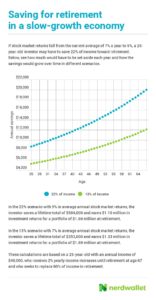 As my Financial Post blog today recaps, a new study being released today by the San Francisco-based personal finance site NerdWallet warns that just to retire by age 70, today’s millennials would have to save a whopping 22% of yearly income. Click on the highlighted text for the FP piece: Millennials may have less time on their side, U.S. retirement study shows.
As my Financial Post blog today recaps, a new study being released today by the San Francisco-based personal finance site NerdWallet warns that just to retire by age 70, today’s millennials would have to save a whopping 22% of yearly income. Click on the highlighted text for the FP piece: Millennials may have less time on their side, U.S. retirement study shows.
The adjacent chart shows the math and how much millennials would need to save every year, depending on whether the stock market generates its historic 7% annual rate or the more pessimistic projections of 5%.
“Era of supernormal returns is over”
Martin Small, head of US iShares for BlackRock , told Nerdwallet that “the era of supernormal returns is over. Over the longer term, younger investors should expect yields and equity market returns to be low.”
A survey by Transamerica Center for Retirement found 72% of millennials are already saving for retirement, and 30% are saving a respectable 10% of income. But given these gloomy projections, Millennials will have to get cracking on saving now, while they’re still in their 20s.
Nerdwallet found that if a 25-year old puts saving off until they’re 35, he or she would have to save a “nearly impossible” 34% of income every year ($16,400 on average), to retire at 67 with 80% of the income they earned in their working years.
ETFs, robo-advisers recommended for Millennials
Time is on the Millennials’ side but they’re going to have to make sure their money gets a decent return. That means not just saving in low-yielding savings accounts but properly investing it in equity funds. And when they do, they should pay attention to investment costs.
Nerdwallet says exchange-traded funds (ETFs) provide both low fees and offer quick and easy diversification. Compared to higher-fee vehicles like mutual funds, Nerdwallet found millennials could save hundreds of thousands of dollars just by using ETFs over a lifetime.
It also mentions robo-advisers, most of which also use ETFs, but package them up in convenient set-it-and-forget packages, typically at 0.5% a year on top of the ETF fees.

